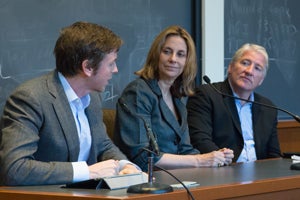In a changing technological landscape, the news media industry has faced great upheaval, and the relationship between political actors and journalists has changed significantly.
On April 3, a group of journalists gathered to discuss this changing relationship. The panel, entitled “The Role of Media in the U.S. Political System” and sponsored by the HLS American Constitution Society, featured CNN’s John King, Melinda Henneberger, political reporter for the Washington Post, and Peter Hamby, national political reporter for CNN.
The entire industry has faced cutbacks, Henneberger said, so news organizations are working with fewer resources than in the past. Simultaneously, the rise of new technology has allowed candidates to bypass traditional news outlets and go straight to the voters. This has made “watchdog journalism” much more difficult, she said. And, Hamby added, the proliferation of web sources has changed the incentives of journalists.
“The web puts a premium on speed, scoops, trivia, clicks, so there’s value and action in some of that,” Hamby said. “But in this ecosystem there’s still an importance for legacy and mainstream media outlets who have financial resources to cover a lot of different issues in a lot of different countries and places in the world.”
For example, he said, state capitals are home to interesting debates over policy, but local outlets often do not have the resources to cover them. It then may fall to national outlets—whose own resources are stretched thin—to report on these stories.
Henneberger wondered whether readers have thought about the impact of their clicks, or about where foreign news and investigative journalism—important checks on candidates—will come from.
“Readers and viewers get the media they want,” Henneberger said. “We are trying to survive, so we are responding more than ever to what people actually want to consume.”
Another consequence of the technological and social media revolution has been a decline in access to politicians, the panelists said. According to Hamby, access to sources is a crucial part of in-depth coverage of officials and candidates. In the past, reporters were able to get a sense of who their subjects were. Now, he said, politicians are gun-shy; they do not allow reporters to get too close because they fear that any gaffe will be immediately projected to the world on Instagram and Twitter. Henneberger said that when she covered Al Gore’s presidential campaign in 2000, it was not unusual for Gore to call her home at midnight to clarify or explain something. But things have changed, she said.
The “underappreciated downside” of this, Henneberger said, is that reporters lack the information to provide rounded portraits of the candidates. For example, Hamby said, Sarah Palin and Rick Perry were both skilled politicians, but were never portrayed that way in the media because reporters were unable to get close to them.
With the rise of sophisticated predictive statistical analysis—such as the work of Nate Silver—technology has also had an impact on the substance of the news, panelists said.
Such technology for analyzing human behavior may free up reporters to actually talk to voters, to cover the issues, to look at who and what are behind the candidates, King said, and Hamby agreed that polling has value.
Still, statistical analyses are often wrong and fail to consider the bigger picture, Hamby said. When reporters only look at polls and only interview political consultants, they may fail to notice what is happening with voters in the field.
“Technology has changed everything,” King said. “But voters are human beings and human beings sometimes surprise us.”
According to King, polls are covered too extensively, often at the expense of long-form profile pieces that provide readers with a deeper sense of the candidates. And news organizations frequently report all the available polls without analyzing them for viewers, leading to a glut of misunderstood information, Hamby said.
Nevertheless, despite all the changes, King does not believe that the death knell has sounded for the news media. Every industry has been forced to change because of technology, he said. Because the media are increasingly diverse, it is simply taking longer to figure out how to monetize and deliver the news.
“I would argue it’s a great time to get in the business if you’re young, you’re nimble, you understand technology and you’re not afraid to scrape up your knees,” he said. “The thirst for information is greater than ever, the business just needs to figure out how to do the financial model.”
